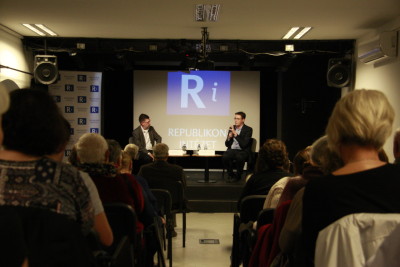With only half a year until the 2018 general election in Hungary, Republikon Institute launched a new series of conferences about the political options for liberal voters in Hungary. The project called “Who should liberals vote for?” intends to contribute to the orientation and mobilization of liberal voters by inviting a leading politician from every relevant political party to a conference. At these events each party has an opportunity to explain the presence and fulfillment of liberal viewpoints in their programmes. The importance of the series is indisputable considering the so-called “illiberal governance” of the ruling party and the fragmented democratic opposition.
The first event took place on October 25 with the participation of Gergely Karácsony, the Együtt-Párbeszéd alliance’s candidate for prime minister. Karácsony stated that the only way to restore liberal democracy in Hungary is to vote for their manifesto called “Everyone Matters”. The main principle of this programme is reducing social inequalities. Therefore, he wishes to introduce guaranteed basic income in order to reduce vulnerability and prevent citizens from living in extreme poverty. Moving forward is not possible without offering high quality education, healthcare, and public services, because people will not believe in a fair social system until they find effective solutions for their everyday problems, he said. He admitted that this is not a classical liberal principle, but in his opinion, a liberal democracy would not function well without a strong, solidary society, so strengthening social cohesion is the first step on the way.
In a liberal state the elements of liberal rights should also be secured, but Hungary is currently very far from this state, according to Karácsony. However, it had already been the same even before 2010, when the current governing party took over the power. The values of a fair society and the republic have been harmed back then, and thus a large segment of society does not believe in a fair society. This is the main reason behind the success of Viktor Orbán’s illiberal state, he said.
 Karácsony believes that political liberalism works best in Northern states, which are not classical liberal countries, but highly redistributive policies and various welfare state services are implemented. These countries also follow the model of consensus democracy, which should also be applied in Hungary along with a more proportional electoral system. He stated that they would need at least two, but rather three terms to completely reconstruct the state to the abovementioned level. Another crucial step is the improvement of the political culture, which is a long and complicated process. However, it is inevitable and there are no other alternatives, he added.
Karácsony believes that political liberalism works best in Northern states, which are not classical liberal countries, but highly redistributive policies and various welfare state services are implemented. These countries also follow the model of consensus democracy, which should also be applied in Hungary along with a more proportional electoral system. He stated that they would need at least two, but rather three terms to completely reconstruct the state to the abovementioned level. Another crucial step is the improvement of the political culture, which is a long and complicated process. However, it is inevitable and there are no other alternatives, he added.
With only six months until the election it is still unclear which form of electoral cooperation will the parties of the democratic opposition use. According to Karácsony, the best strategy for a change of government is to run only one opposition candidate in each constituency, but the parties should not form one common list. Left-liberal parties should not compete against each other in electoral districts, and it is also vital to find those strong and trustworthy candidates, who can be able to win the swing seat districts.
However, it would not be disastrous if they ran for the election on separate lists without one common prime ministerial candidate, he said. This way their diversity could prevail, and they would not have to form undesirable alliances. Karácsony emphasized that cooperation requires a common moral foundation, which exists between democratic opposition parties, but it does not include right-wing opposition.



